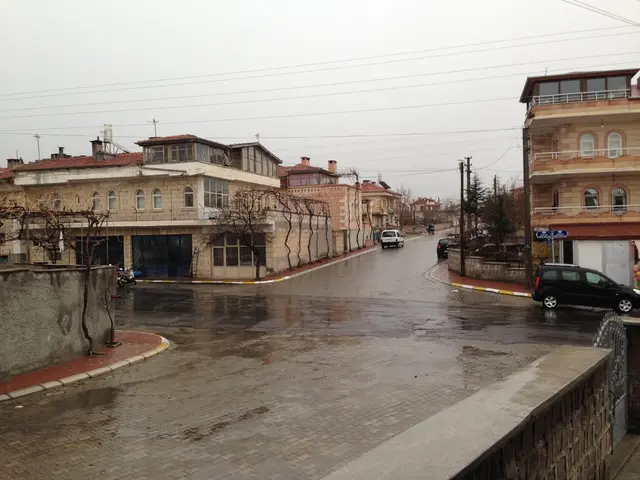African Nations with Extensive Railway Networks 2025: Ranking the Top 10
Africa's Top Ten Countries with the Longest Railway Lines in 2025
Africa's railway networks are undergoing significant transformations, as they merge historical legacies with modern enhancements. This transformation is crucial for fostering economic growth, interconnection, and trade across the continent. In 2025, the following African nations will have the longest railways:
Top Ten Countries with the Longest Railway Lines in Africa, 2025
1. South Africa
South Africa hosts the continent's longest train network with 20,986 kilometers of tracks. Managed by the state-owned enterprise, Transnet Freight Rail, the network encompasses both freight and passenger services. South Africa's rails have played a vital role in shaping its economy and industry, with the Sishen-Saldanha line—a 860-kilometer heavy-haul railway—as a notable example. This line connects mines in the Northern Cape to the export terminal at Saldanha Bay on the Atlantic Ocean and is designed to carry bulk goods, primarily iron ore.
2. Sudan
The railway system in Sudan stretches over 7,251 kilometers, linking major towns and boasting historical and geographical significance. This rail network also serves as a critical trade and transportation route across Sudan's challenging desert landscape. Major cities such as Khartoum, Port Sudan, Atbara, and Nyala are connected by the railway, boosting the transportation of goods, agricultural products, and people.
3. Egypt
With a network of 5,085 kilometers, Egypt boasts one of the longest and most historically significant railway networks in Africa. Railroads in Egypt were the first in Africa and the Middle East and, built in the 19th century, have changed the way people traveled in the region. Key lines connect major cities like Cairo, Alexandria, and Aswan to facilitate short- and long-distance travel for millions of people.
4. Mozambique
Mozambique's railway network spans 4,787 kilometers and plays a pivotal role in its economy and the regional trade system in Southern Africa. Crucial export routes for coal, agricultural products, and other resources are facilitated by the railway system. The Beira Corridor and the Maputo Corridor are two of Mozambique's most significant commerce routes, strategically linking the ports with neighboring landlocked countries.
5. Tanzania
Tanzania boasts a railway network totaling 4,097 kilometers, serving as an essential transportation means for integrating the Indian Ocean with the landlocked interior of the country and its neighbors. Trade, mobility, and economic integration in East and Southern Africa are greatly benefited by this vital rail network. The TAZARA Railway (Tanzania-Zambia Railway Authority) is the backbone of Tanzania's rail network, connecting the bustling port city of Dar es Salaam with central Zambia.
6. Algeria
Algeria's extensive railway network, 4,020 kilometers in length, supports its industrial and economic growth. With a strategic location in North Africa, Algeria has made substantial investments in its rail system to bolster regional trade and internal mobility. The nation's railroads are instrumental in facilitating the expansion of industries like manufacturing, energy, and mining by efficiently transporting industrial goods, raw materials, and minerals.
7. Democratic Republic of the Congo (DRC)
The 4,007-kilometer railway network in the DRC is crucial in enabling the survival of one of Africa's most resource-rich but infrastructure-poor countries. Efficient transportation solutions are paramount here, as road transportation is unreliable or non-existent in many rural areas, particularly for mining towns. Valuable resources like copper, cobalt, and diamonds can be effectively transported thanks to the railway system, connecting mining centers with export terminals.
8. Kenya
Kenya boasts a 3,819-kilometer railway network, making it a key player in East Africa's transportation sector. The Standard Gauge Railway (SGR), a revolutionary infrastructure project, serves as the network's cornerstone. Introduced in 2017, the SGR connects Nairobi with the vibrant coastal port of Mombasa, transforming the way goods and people travel throughout the region. Over 470 kilometers long and designed to support both passenger and freight services, the SGR has significantly increased the efficiency of supply chains while reducing travel times and transportation costs.
9. Nigeria
Nigeria, home to Africa's largest economy and population, is currently developing a railway network that covers 3,505 kilometers. Nigerian railways, historically a regional leader in rail transportation, are experiencing a resurgence, aiming to reclaim their former significance and contribute to the nation's contemporary economic goals. Previously, the railway network facilitated the transport of raw resources and agricultural products from hinterlands to the ports during the colonial era. However, due to years of neglect and underinvestment, the system has suffered a decline in reliability and usage.
10. Zimbabwe
Zimbabwe has a railway network that stretches over 3,427 kilometers, connecting the country's major urban and industrial hubs. The National Railways of Zimbabwe manage the network, linking mining and agricultural areas with cities like Harare, Bulawayo, and Mutare. Zimbabwe's railways have been crucial for decades in moving coal, minerals, and agricultural goods, supporting a significant portion of the nation's export and industrial operations. The network facilitates the transportation of valuable resources like coal, ferrochrome, gold, and platinum to domestic processing facilities and export routes, especially via regional corridors that link Zimbabwe to neighboring countries like South Africa, Mozambique, Botswana, and Zambia.
Enhanced railway networks promote economic growth and trade competitiveness, reduce trade costs, and boost regional integration in Africa. These transformations are fueled by factors such as infrastructure convergence, regional integration, and investments. Despite challenges, ongoing projects, and expansions ensure that the list of countries with the longest railways may fluctuate over time.
- The railway networks in these African nations are not only vital for domestic transportation but also serve as crucial financing opportunities for the continent's economic growth, as they attract investments from the global finance industry, particularly in sectors like infrastructure development and trade.
- The expansion and modernization of these extended railway networks will undoubtedly impact the transportation industry, leading to a significant reduction in shipping costs for goods transported across borders, which, in turn, will foster competitive advantages for the African continent in the global market.








